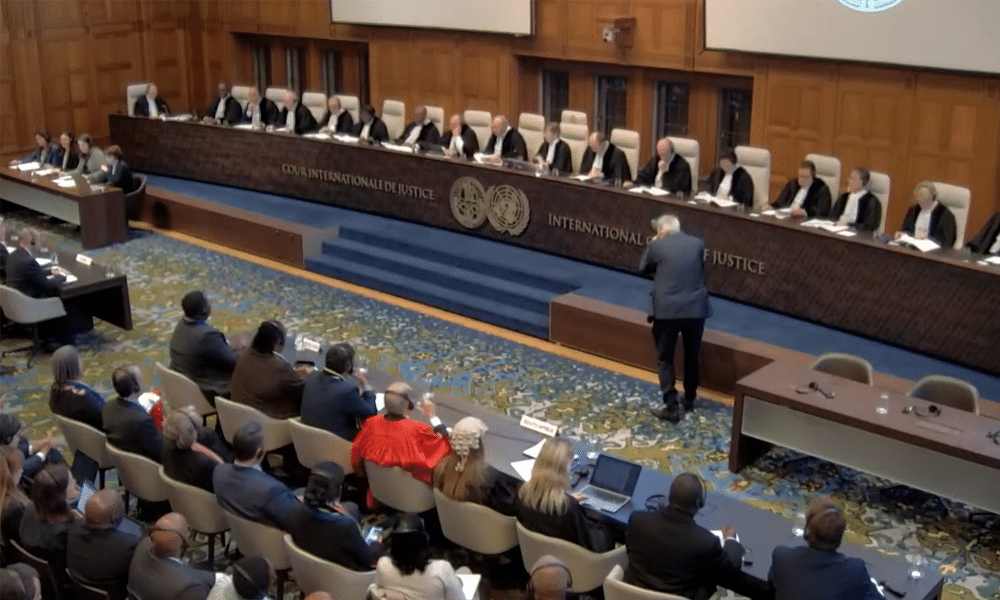The United Nations’ International Court of Justice (ICJ) has ordered Israel on Friday (26 Jan) to implement measures to prevent acts of genocide in its conflict with Hamas militants in Gaza. However, the court stopped short of demanding an immediate ceasefire.
This high-profile judgment was delivered in response to a case brought by South Africa, which accused Israel of conducting state-led genocide.
The ICJ mandated that Israel “must ensure its forces do not commit genocide” and take proactive steps to improve the humanitarian conditions for Palestinian civilians.
“Israel must take immediate and effective measures to enable the provision of urgently needed basic services and humanitarian assistance to address the adverse conditions of life faced by Palestinians,” the court stated in its verdict.
The presiding judge, Joan Donoghue, addressing the representatives in The Hague, remarked on the severity of the situation: “Israel’s large-scale military operation by land, air and sea has left Gaza to become a place of death and despair.” She further expressed the court’s deep concern over the “continuing loss of life and human suffering.”
Donoghue also confirmed that the court found sufficient evidence to proceed with the genocide allegations. “The court would not throw out the case as Israel requested,” she stated.
15 of the 17 ICJ panel judges voted in favour of emergency measures largely aligning with South Africa’s requests, except for a directive to halt Israeli military actions in Gaza.
According to Gaza health authorities, the Israeli military operation, which began after Hamas’s cross-border incursion on 7 October, has resulted in over 26,000 deaths. Israeli officials report a lower death toll of 1,200, mostly civilians, and 240 people taken hostage; however, the updated casualty figures come to 1,139.
Reacting to the charges, Israeli Prime Minister Benjamin Netanyahu vehemently denied the accusations of genocide, calling them “outrageous.”
He emphasized Israel’s right to self-defense: “Like every country, Israel has an inherent right to defend itself. The vile attempt to deny Israel this fundamental right is blatant discrimination against the Jewish state, and it was justly rejected. But the mere claim that Israel is committing genocide against Palestinians is not only false, it’s outrageous, and the willingness of the court to even discuss this is a disgrace that will not be erased for generations.”
Israel’s National Security Minister, Itamar Ben-Gvir, appeared to scorn the World Court’s verdict with a dismissive comment, “Hague shmague,” posted on social media.
Palestinian Foreign Minister Riyad al-Maliki welcomed the ICJ’s provisional measures. “The ICJ judges assessed the facts and the law; they ruled in favour of humanity and international law,” he stated in a televised speech.
Palestine welcomes the provisional measures ordered by the International Court of Justice today. The ICJ judges assessed the facts and the law. They ruled in favor of humanity and international law.
We call on all states to ensure that all provisional measures ordered by the… pic.twitter.com/aLeVXRJNVl
— State of Palestine – MFA ???????????????? (@pmofa) January 26, 2024
South Africa, on the other hand, hailed the ruling as a “decisive victory” for international law. “South Africa sincerely hopes that Israel will not act to frustrate the application of this Order… but that it will instead act to comply with it fully, as it is bound to do,” stated its department of international relations and cooperation.
Naledi Pandor, South Africa’s minister of international relations, highlighted the implicit need for a ceasefire to facilitate humanitarian efforts. “How do you provide aid and water without a ceasefire? If you read the order, by implication a ceasefire must happen,” she stated outside the court in The Hague.
The ruling was celebrated within South Africa, with senior government officials and members of the ruling African National Congress party publicly expressing their approval.
Senior Hamas official Sami Abu Zuhri termed the decision as significant in isolating Israel and exposing its actions in Gaza.
Despite Israel’s earlier expectations for the case’s dismissal, the ICJ’s decision, while not resolving the core accusation of genocide, underscores the urgency of intervention and the Palestinians’ right to protection.
ICJ rulings, though legally binding, lack enforceable power. The court’s limitations in enforcing its decisions are exemplified in cases like its order against Russia’s invasion of Ukraine, which was ignored.
A definitive ruling on whether Israel is committing genocide in Gaza remains to be determined in a subsequent phase of the legal proceedings, which may take several years.

